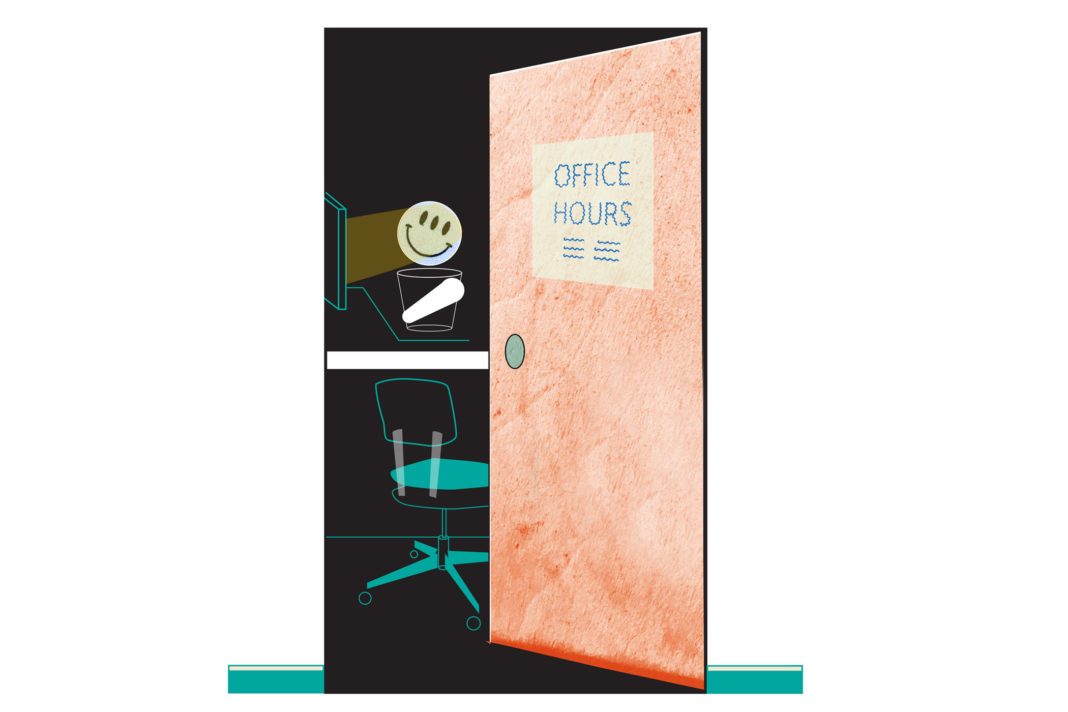Pick a class to pay attention in.
Obviously you’re supposed to pay attention in all your classes, and you totally should. But let’s be honest: You’re definitely not going to pay equal attention. Some classes will grab you, some you’ll struggle with, some you’ll snooze through. On the whole, that’s okay. But I recommend starting your mentor search with an exercise in intentionality: Pick a class to pay attention in.
Each term, make a conscious decision to choose one class that really tickles you for whatever reason, and make an extra special effort to pay attention in—and, more importantly, to—that class. It almost doesn’t matter why the class tickles you. Maybe the subject is some super fascinating aspect of your major, or something you’ve always wanted to learn about. Maybe it’s scheduled for right after your daily swim time and you’re always high on endorphins. Maybe the prof is just unbelievably handsome and you can’t help hanging on every word he says. It doesn’t matter, because the point is to get in the habit of paying attention to your professors.
Remember: Every class is, at minimum, actually two classes. Any given class is a course in, well, whatever the class is nominally about, but it’s also a class in how to teach that subject. When you spot a professor who not only understands their subject but teaches it well, pay extra special attention. Which leads us to…
Study your professors, and when you find one you like, stick with them.
Research professors on ratemyprofessor or some similar site, ask your friends and peers, talk to your advisor. Look for personal style: not just whether they’re a good teacher (all the teachers here are good teachers, natch) but whether or not they sound like good teachers for you. My first quarter here (doing a post-bacc TESL certificate) I went out of my way to take a writing class with a professor who had a reputation for being harsh and condescending, because it has generally been my personal experience that teachers with a reputation for being harsh and condescending have the most to teach me. It ended up being a wonderful class (he was indeed harsh, and a little aloof, but never condescending). I learned a ton of useful writing and—more importantly—editing skills that I still use every day.
Other times you’ll happen upon professors because they’re teaching a class you have to take for your degree. This has happened to me a few times at PSU, most memorably with a linguistics professor and with a Spanish language teacher. I ended up taking a bunch of great classes with that linguistics teacher, and she eventually wrote me the letter of recommendation that got me into grad school. The Spanish teacher reportedly hated teaching their required language courses, but a few of my friends who’d taken his upper division classes sang his praises. The prof was nice enough and seemed pretty damn smart (plus we shared a love for film and he took it easy on me during a nasty two-week summer session of 203) so I signed up for his Latin American Culture and Civilization class. I ended up hanging out in his office talking about movies and academia and studying abroad and so on. Eventually he suggested I apply for a Fulbright Scholarship, and offered to write me a recommendation. And that leads us to…
Go to their offices.
Every professor has regular office hours and will also make appointments. Make excuses to go see them. You should be doing this anyway, actually. Office visits are a great way to check on your progress in the course. I always check in with my professors (even the ones I don’t like) about three weeks after the class starts. Good check-up questions include: “How am I doing in this class so far? Is there anything I seem to be missing? What can I do to improve my performance in this class?” Remember that you are paying a portion of their salaries; they may be older and wiser than you, but they also kind of work for you. There’s no reason not to get your money’s worth. (The same argument applies to using the campus rec center. Go use the rec center!)
Of course, if you are having an actual difficulty in the class, that’s also a great excuse to drop by or schedule a meeting. Think of it like going to the doctor: When you’re sick you go to the doctor to get well, and when you’re well you go to the doctor to stay well.
Another benefit of office visits is that you will both learn from the experience. You’ll do better in class because you’ll have the benefit of extra teaching; a good office visit can almost be like a free tutoring session from the most qualified person in the class. And your professor will do better in class as well, not just because we understand things better when we teach them but because your response to their class serves as a diagnostic of their teaching techniques. Also, eventually they’ll be looking for a teaching assistant and you’ll be looking for a job. Which brings us right up to:
Keep in touch.
Once you’ve made friends with your professors, stay in touch with them—just like any other friend. You can still drop by their office, even if you’re not taking classes with them. If the friendship is especially informal, you might get lunch together or connect on social media. This is not a requirement, of course; I myself prefer a more formal relationship, and not just because I’m forty and an introvert. You can also use online networking platforms to stay in touch, both generalized sites and ones geared to your field. At the very least, though, make sure you have each other’s email addresses and phone numbers.
Always be cool.
This is the most important thing, always. It’s easy advice to give, but not always as easy to follow. Be nice, be courteous, be professional, be honest. Ask questions and listen to the answers. Treat your professors—and all your fellow humans—with respect and dignity. Be cool.






